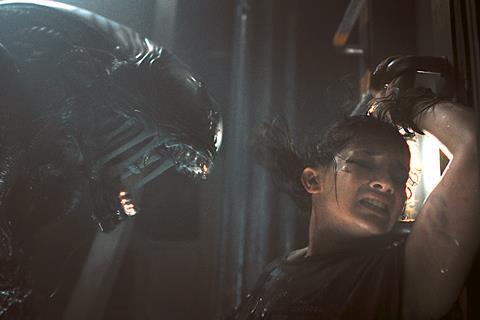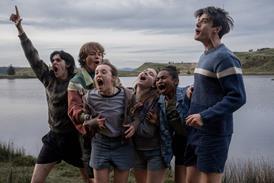Cailee Spaeny picks up the cudgel in this efficient, derivative addition to the Alien franchise

Dir: Fede Alvarez. US. 2024. 119mins
An efficient addition to the 45-year-old franchise, Alien: Romulus draws on the strengths of the sci-fi/horror series without ever suggesting that the property’s best days are ahead. This sequel, which appears chronologically on the timeline between 1979’s Alien and 1986’s Aliens, recalls both films as it introduces a new set of younger characters to do battle with the iconic extra-terrestrials. Cailee Spaeny proves herself as a suitable Sigourney Weaver-like action hero, and Don’t Breathe director Fede Alvarez gives the proceedings a grimy nightmarishness, but there’s a nagging sense that Romulus is a mere footnote in a once-grand franchise — effective but derivative.
Alvarez seems to be consciously moving away from Ridley Scott’s more intellectual approach
This Disney release plays in Edinburgh’s Midnight Madness section before opening globally on August 16. Romulus is the series’ seventh instalment — not including the two Alien Vs. Predator pictures — and the first since 2017’s Alien: Covenant, which grossed an underwhelming $241 million worldwide. Alvarez has had success with the low-budget horror films Evil Dead ($98 million) and Don’t Breathe ($158 million), and Romulus represents his move to the mainstream. Reviews may only be lukewarm, but the film could do solid box office, further boosting the profiles of Spaeny, David Jonsson and Spike Fearn — the latter two Screen Stars of Tomorrow in, respectively, 2023 and 2024.
Spaeny plays Rain, a 25-year-old woman working on a sunless mining colony who is desperate to find a better life. Accompanied by her ’brother’ Andy (Jonsson), an android whose directive is to protect her as she has no family, Rain embarks on a daring mission with other disenfranchised miners, swiping a spaceship that will provide safe passage to another planet. Along the way they encounter a seemingly abandoned space station that happens to house the infamous xenomorphs, which quickly attack Rain and her colleagues.
In recent years Ridley Scott, who directed Alien, has returned to helm the elegant if somewhat ponderous prequels Prometheus and Alien: Covenant. Scott serves as a producer on Romulus, but Alvarez (who co-wrote the screenplay with frequent collaborator Rodo Sayagues) seems to be consciously moving away from Scott’s more intellectual approach. In its place is a focused action-horror that, in terms of tone, is closer in spirit to James Cameron’s Aliens, which amped up the intensity and shoot-outs. Which is not to deny Alien’s clear influence on Romulus, as cinematographer Galo Olivares and production designer Naaman Marshall mimic the original’s grungy interiors and claustrophobic dread.
Alvarez has hit upon a potentially clever idea - young protagonists still in their 20s, who are just adjusting to adulthood when they are beset by this unfathomable terror. Unfortunately, many of these characters — including Fearn’s boringly brooding Bjorn — tend to do foolish things when it is most convenient for the story. The humans will become enraged by Andy who, due to a plot twist that should not be spoiled, starts to act in a more coldly pragmatic way, letting Rain’s cohorts die rather than rescuing them and potentially endangering the remaining survivors. But, as played by Jonsson, Andy is the one individual behaving in a logical manner, which only underlines the idiocy of the other characters whose poor decisions allow the xenomorphs additional opportunities.
These H.R. Giger-inspired creatures have lost none of their haunting power, and Romulus’ myriad practical effects and miniatures help the film capture Alien’s tactile, lived-in quality. With a notable exception near the end, the relentless extra-terrestrials behave as expected, and the director puts the audience through the wringer as the characters run for their lives through the space station. Romulus achieves its goal of being nothing more than a well-executed monster movie, but that modest ambition leaves this sequel feeling a little hollow and mechanical — a sufficient thrill ride that largely reminds the viewer how masterful the first two instalments were.
Longtime fans may have mixed feelings about some of the obvious references to previous chapters, with beloved individuals and memorable lines brought back to only sporadically satisfying effect. More pleasing is Spaeny as this ragtag group’s unlikely leader, who discovers she may be more resourceful than she realised. In Priscilla and Civil War, Spaeny specialised in playing women at a bit of a remove, but here she gives a visceral performance, with Alvarez unsubtly but persuasively shooting her in ways that will bring to mind Weaver’s mighty Ripley – especially in her Oscar-nominated turn in Aliens.
Even so, the stars of this series are not the humans or the androids but, rather, those xenomorphs, who reliably wreak havoc when given the chance. In Romulus, they’re still fantastic beasts, even if the film around them isn’t so killer.
Production companies: Scott Free, Brandywine
Worldwide distribution: Disney
Producers: Ridley Scott, Michael Pruss, Walter Hill
Screenplay: Fede Alvarez & Rodo Sayagues, based on characters created by Dan O’Bannon and Ronald Shusett
Cinematography: Galo Olivares
Production design: Naaman Marshall
Editing: Jake Roberts
Music: Benjamin Wallfisch
Main cast: Cailee Spaeny, David Jonsson, Archie Renaux, Isabela Merced, Spike Fearn, Aileen Wu























